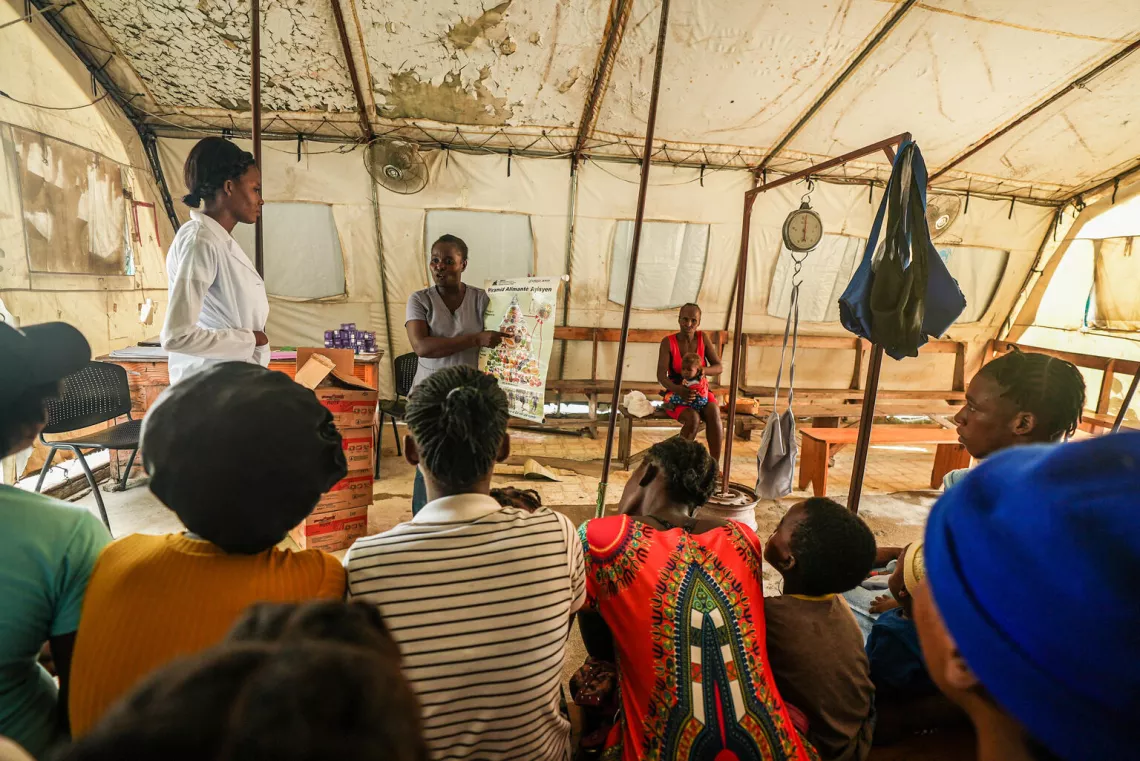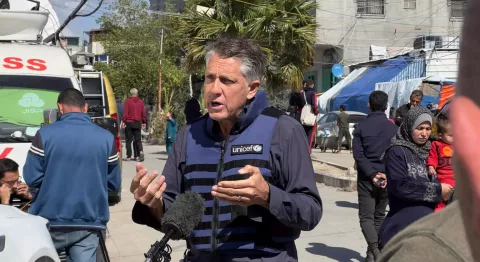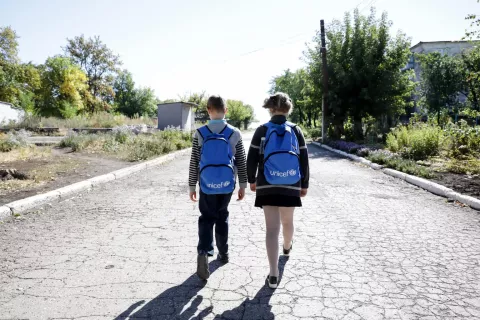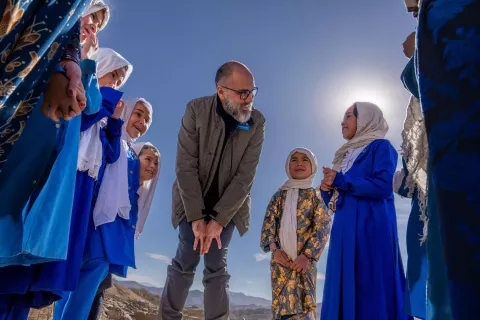I pen these words following a recent visit to Artibonite, in northern Haiti, a visit that has left an indelible mark. I heard firsthand how children and families have been thrust into the abyss of despair. How they are grappling with fear, uncertainty, and unimaginable hardships. Violence, poverty, school closures, and a resurgence of cholera and malnutrition are pushing them to the breaking point.
I had the privilege of speaking with Paulette Constant. At 64 years old, Paulette has endured more suffering than most. Originally from Artibonite, she fled with her family, children, and grandchildren to the capital, Port-au-Prince. While there, one of her daughters died while giving birth, leaving Paulette responsible for five grandchildren.
This heartache was followed by the recent violence in Port-au-Prince, which compelled her to return to Artibonite.
“The criminals assaulted us, and then they set our house on fire,” she tells me. “So we quickly fled back to Gonaïves [the capital of Artibonite department].”
“One of my children also went to the Dominican Republic in search of a better life, leaving behind four children. This means that at the moment I have nine children under my care, and I no longer have the means to feed them or send them to school.”
Paulette says that some acquaintances in Artibonite are temporarily providing shelter, but the family has been in limbo for three months. “We are left in uncertainty, unsure of what tomorrow holds.”
Lives in limbo
I asked myself time and time again why so many are having to endure a lifetime of pain. Because the reality is that Paulette’s narrative echoes the experiences of countless others in the Artibonite department and across Haiti. Brutal violence, mirroring that seen in Port-au-Prince, has forcibly displaced families and disrupted rice and agricultural production, a lifeline for the economy. By June 2023, more than 22,000 people had been displaced – double the number from just a couple of months earlier. Most have sought refuge among host communities, while hundreds of others are sheltering in precarious, makeshift spaces with little access to basic services or protection from armed groups.

Even in the face of such adversity, the Haitian people demonstrate the true meaning of solidarity and resilience. Host communities warmly welcome displaced families and children, sharing the little they have with open hearts. In their compassion, we find hope and humanity. I have also been moved by the unwavering dedication of school directors, teachers, and the Ministry of Education for their tireless efforts in welcoming all displaced children into classrooms.
Nevertheless, this crisis is placing an enormous strain on the already limited resources of host communities and existing social services. More than 100 schools in Artibonite have shut down due to insecurity, and only a quarter of health facilities across the department remain accessible due to security-related challenges. Across the department, roughly a third of the population, nearly half of them children, now require humanitarian assistance.

Together with partners, UNICEF has reached more than 150,000 people with health services, including through a cholera vaccination campaign, and 350,000 people have been provided with safe drinking water, chlorine tablets, and hygiene kits. In addition, more than 32,000 children have been screened for malnutrition this year, including more than 3,400 who were provided with life-saving ready-to-use therapeutic food, which UNICEF procures for the entire country. Dozens of health workers have been deployed to support the struggling health system, while education kits have been distributed to more than 13,000 students in areas affected by violence. Hundreds of the most vulnerable families are receiving cash assistance to help with schooling.
Of the $246 million required by UNICEF to address the needs of Haiti's children in 2023, only 20 per cent has been secured. The urgency of the situation cannot be overstated. I strongly urge governments, donors, and humanitarian partners to stand with us.
Our work on the ground is a lifeline for these families and children. But the situation remains volatile. Armed group attacks may occur at any moment, and the movement and displacement of the population may increase in the coming weeks. The uncertainty of the situation therefore requires unwavering commitment and immediate action.
But perhaps most of all, hope for Haiti’s children rests on solidarity. The international community recognizes the unique challenges Haiti faces and provides crucial support to improve the living conditions of children. Together, we can break the cycle of violence and poverty, create opportunities, and help Haiti's children realize their potential.
As we stand at this critical juncture, the future of Haiti’s children hangs in the balance. Their dreams of peace, security, and boundless opportunity can only become a reality with our collective support. The road ahead is fraught with challenges. But together, we can ensure that Haiti’s children – the nation’s greatest treasure – are given the chance to reclaim their childhoods, and build a future filled with hope.
Bruno Maes is UNICEF Representative in Haiti.





